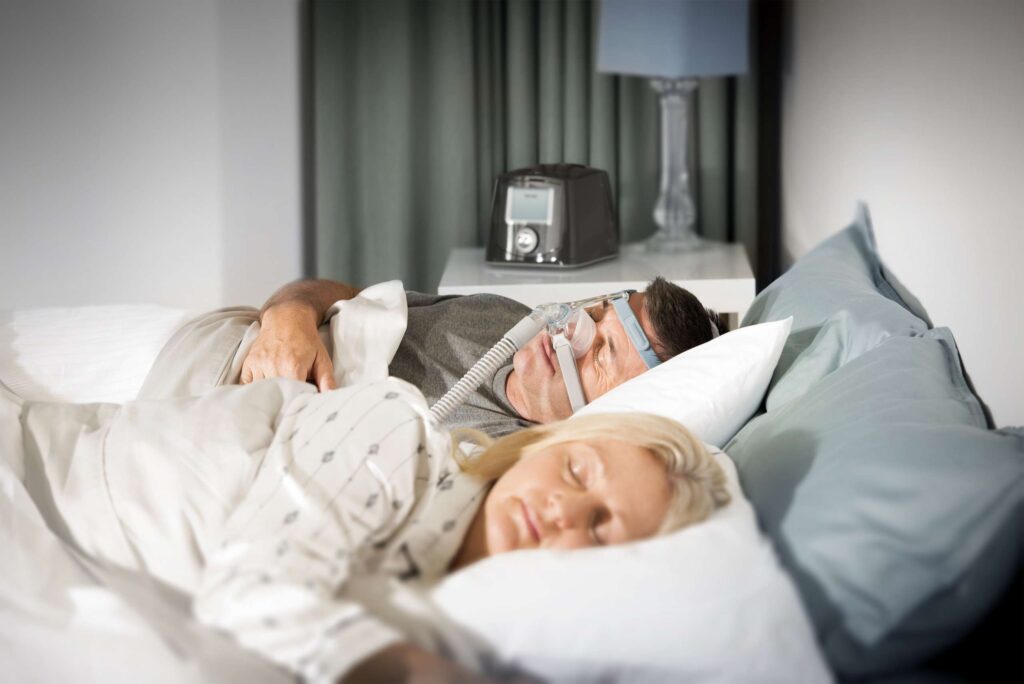Sleep is more than just a time for rest — it’s essential for emotional balance, focus, and mental clarity. But for millions of people living with sleep apnea, restful sleep is often disrupted, leaving them tired, anxious, and emotionally drained.
What many don’t realize is that sleep apnea doesn’t just affect your body — it deeply impacts your mind and emotional health too. In this article, we’ll explore how poor sleep quality caused by sleep apnea can influence your mood, memory, and mental well-being, and what treatments — from lifestyle changes to CPAP therapy — can help restore both your rest and peace of mind.
What Is Sleep Apnea?
Sleep apnea is a sleep disorder where breathing repeatedly stops and starts during sleep. These interruptions can happen dozens or even hundreds of times per night, preventing deep, restorative rest.
There are two main types of sleep apnea:
- Obstructive Sleep Apnea (OSA): The most common type, caused by the throat muscles collapsing and blocking airflow.
- Central Sleep Apnea (CSA): Occurs when the brain fails to send signals to the muscles that control breathing.
Each time your breathing stops, oxygen levels in your blood drop, triggering your brain to wake you up briefly to restart breathing. This constant cycle of disruption fragments your sleep and prevents your brain from fully resting.
The Connection Between Sleep and Mental Health
Sleep and mental health are deeply interconnected. Quality sleep allows the brain to repair itself, process emotions, and regulate neurotransmitters such as serotonin and dopamine, which influence mood and cognition.
When sleep disorders like sleep apnea prevent this natural repair process, the effects can show up as irritability, poor focus, and even depression or anxiety.
A study published in the Journal of Clinical Sleep Medicine found that people with untreated sleep apnea are significantly more likely to experience mood disorders and cognitive impairment than those without the condition.
How Sleep Apnea Affects Mental Health
Let’s explore how poor sleep quality and repeated oxygen deprivation from sleep apnea can disrupt your mental well-being.
1. Mood Changes and Irritability
One of the earliest emotional symptoms of sleep apnea is mood instability. Because your sleep is fragmented, your brain doesn’t have enough time to regulate emotional responses effectively.
This often leads to:
- Increased irritability or short temper
- Difficulty managing stress
- Feeling overwhelmed by small frustrations
Without proper rest, even daily tasks can feel more challenging, leading to tension in personal and professional relationships.
See more: How Untreated Sleep Apnea Can Affect Your Brain and Memory
2. Depression and Anxiety
Chronic sleep deprivation alters brain chemistry, reducing serotonin levels — the “feel-good” hormone that stabilizes mood.
People with untreated sleep apnea are more likely to experience depression, anxiety, or emotional numbness. In fact, a 2019 review in Sleep Medicine Reviews found that up to 50% of people with sleep apnea also have depressive symptoms.
The good news? Studies show that CPAP therapy (Continuous Positive Airway Pressure) can significantly improve mood and reduce anxiety within weeks of consistent use.

3. Cognitive Decline and Memory Issues
Poor sleep affects the brain’s ability to store and retrieve information. When oxygen levels drop during sleep apnea episodes, parts of the brain — especially the hippocampus, which handles memory — receive less oxygen, impairing cognitive function.
This can result in:
- Forgetfulness
- Trouble concentrating
- Slower reaction times
- Reduced problem-solving ability
Over time, these issues can mimic early signs of dementia if left untreated.
4. Brain Fog and Fatigue
Many people with sleep apnea report waking up feeling unrefreshed, no matter how long they’ve been in bed. This persistent brain fog can make mornings sluggish and productivity difficult.
This happens because deep sleep stages (particularly REM sleep) — when your brain consolidates memories and clears out toxins — are constantly interrupted by micro-awakenings caused by breathing pauses.
5. Increased Risk of Neurodegenerative Diseases
Emerging research links long-term, untreated sleep apnea with an increased risk of Alzheimer’s disease and Parkinson’s disease.
The reasons? Chronic oxygen deprivation and inflammation from poor sleep may contribute to amyloid plaque buildup — one of the hallmarks of Alzheimer’s. While more studies are needed, it’s clear that maintaining good sleep health is essential for brain longevity.
How Treating Sleep Apnea Can Improve Mental Health
Addressing the root cause of poor sleep quality can make a world of difference for your mental well-being. Effective sleep apnea treatments can restore balance to your emotional and cognitive health.
1. CPAP Therapy: The Gold Standard
CPAP therapy (Continuous Positive Airway Pressure) is one of the most effective treatments for obstructive sleep apnea. It works by keeping your airway open with a steady stream of air through a mask, ensuring uninterrupted breathing throughout the night.
Many users report:
- Better mood and focus
- More energy during the day
- Reduced anxiety and depression symptoms
In a 2021 study, patients who consistently used CPAP showed significant improvements in both sleep quality and mental health within three months.
2. Weight Management and Lifestyle Changes
Since excess weight is a major risk factor for sleep apnea, losing even 5–10% of body weight can help reduce symptoms.
Combine a balanced diet, regular exercise, and limited alcohol intake for the best results. Physical activity also helps improve mood by boosting endorphins, making it a double win for both sleep and mental health.
3. Cognitive Behavioral Therapy (CBT)
CBT for insomnia and anxiety can be an excellent complement to medical sleep apnea treatment. It helps retrain your thoughts about sleep, reduces anxiety before bedtime, and builds healthy sleep routines.
4. Improving Sleep Hygiene
Small changes to your nighttime routine can have big benefits:
- Keep a consistent bedtime.
- Avoid screens 30–60 minutes before bed.
- Use a cool, dark, and quiet bedroom.
- Avoid caffeine, alcohol, and heavy meals close to bedtime.
These habits support your body’s natural sleep rhythms and complement CPAP therapy or other treatments.
When to See a Sleep Specialist
If you experience loud snoring, gasping for air during sleep, or chronic daytime fatigue, it’s time to talk to a doctor. A sleep study can help diagnose sleep apnea and guide the best treatment plan for you.
Left untreated, sleep apnea doesn’t just rob you of rest — it can erode your mental clarity, mood, and overall happiness.
Final Thoughts
Your mental and emotional health are directly tied to how well you sleep. Sleep apnea silently disrupts both, leading to fatigue, depression, and memory problems.
By understanding the connection between sleep health and mental well-being, and by exploring treatment options such as CPAP therapy, lifestyle changes, and better sleep hygiene, you can reclaim your energy, focus, and emotional balance.
Better sleep truly leads to a better mind — and a better life.
FAQS
Sleep apnea is a sleep disorder where breathing repeatedly stops during rest. This disrupts oxygen flow and prevents deep sleep, leading to fatigue, heart strain, and other health issues. If untreated, it can increase the risk of heart disease, stroke, and diabetes.
Common signs include loud snoring, gasping for air during sleep, excessive daytime fatigue, and morning headaches. You might also experience poor concentration and mood changes. If these symptoms persist, a sleep study can help confirm the diagnosis.
Yes, mild cases of sleep apnea can often be managed with lifestyle changes such as weight loss, changing sleep positions, and avoiding alcohol or sedatives. However, moderate to severe cases may still require CPAP therapy or oral appliances prescribed by a sleep specialist.
People who are overweight, smoke, or have a family history of sleep disorders are at higher risk. Men over 40 are more prone, but sleep apnea can affect anyone — including women and even children.

